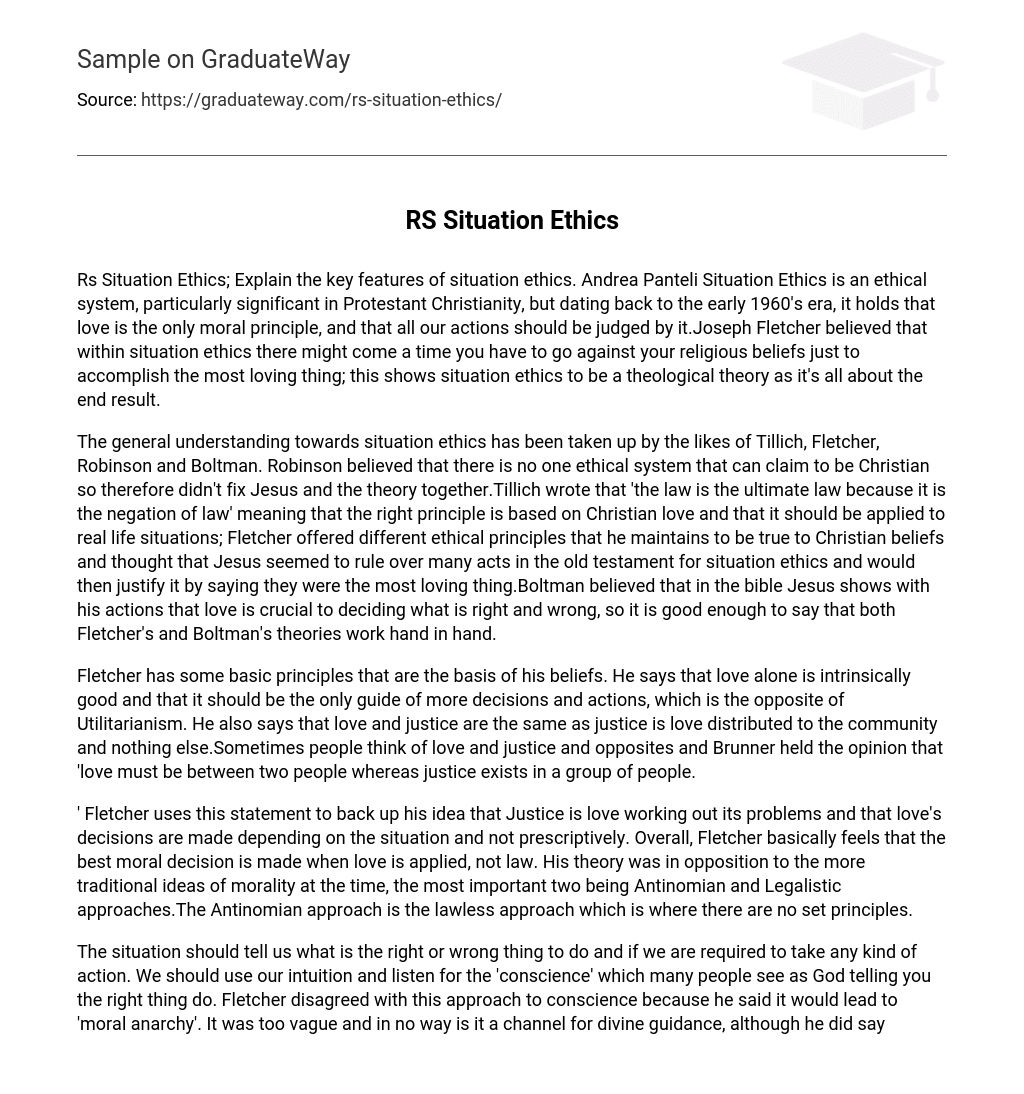Rs Situation Ethics; Explain the key features of situation ethics. Andrea Panteli Situation Ethics is an ethical system, particularly significant in Protestant Christianity, but dating back to the early 1960’s era, it holds that love is the only moral principle, and that all our actions should be judged by it.Joseph Fletcher believed that within situation ethics there might come a time you have to go against your religious beliefs just to accomplish the most loving thing; this shows situation ethics to be a theological theory as it’s all about the end result.
The general understanding towards situation ethics has been taken up by the likes of Tillich, Fletcher, Robinson and Boltman. Robinson believed that there is no one ethical system that can claim to be Christian so therefore didn’t fix Jesus and the theory together.Tillich wrote that ‘the law is the ultimate law because it is the negation of law’ meaning that the right principle is based on Christian love and that it should be applied to real life situations; Fletcher offered different ethical principles that he maintains to be true to Christian beliefs and thought that Jesus seemed to rule over many acts in the old testament for situation ethics and would then justify it by saying they were the most loving thing.Boltman believed that in the bible Jesus shows with his actions that love is crucial to deciding what is right and wrong, so it is good enough to say that both Fletcher’s and Boltman’s theories work hand in hand.
Fletcher has some basic principles that are the basis of his beliefs. He says that love alone is intrinsically good and that it should be the only guide of more decisions and actions, which is the opposite of Utilitarianism. He also says that love and justice are the same as justice is love distributed to the community and nothing else.Sometimes people think of love and justice and opposites and Brunner held the opinion that ‘love must be between two people whereas justice exists in a group of people.
‘ Fletcher uses this statement to back up his idea that Justice is love working out its problems and that love’s decisions are made depending on the situation and not prescriptively. Overall, Fletcher basically feels that the best moral decision is made when love is applied, not law. His theory was in opposition to the more traditional ideas of morality at the time, the most important two being Antinomian and Legalistic approaches.The Antinomian approach is the lawless approach which is where there are no set principles.
The situation should tell us what is the right or wrong thing to do and if we are required to take any kind of action. We should use our intuition and listen for the ‘conscience’ which many people see as God telling you the right thing do. Fletcher disagreed with this approach to conscience because he said it would lead to ‘moral anarchy’. It was too vague and in no way is it a channel for divine guidance, although he did say that it is the process of you making a reasoned choice given the circumstances and is “a verb not a noun”.
The legalistic approach to moral issues is based on a set of absolute laws that everyone has to apply. It is said we should try to apply these moral rules to our everyday lives and to do this there must be a system, made up of sub rules and regulations that we all must follow. Fletcher also disregarded this argument because he saw it as ‘unsatisfactory to apply general rules to modern moral issues. ‘ They did not allow for special circumstances or situations, which ethically made them unfair and unjust, and in Fletchers eyes is wrong because he believes the emphasis is making moral decision rather than following rules.
Fletcher saw the only fair way to deal with moral issues was to use the situation ethics approach. This was developed in opposition to natural law and is a very subjective or relative theory. Fletcher believed that we must take into consideration the different situations that things happen in. He said that individual people and situations take precedence over general moral rules.
Within the six propositions he said that “only one thing is intrinsically good, namely, love: nothing else” which is why he was so against laws.The idea of situation ethics totally revolves around the one idea of love. Fletcher said that if we always did the most loving thing in every situation then this would always be the right thing to do. He put forward four major principles being; relativism, pragmatism, positivism and personalism all of these have flaws but are quite powerful as well, one of the problems with them is that as all situations are different, there will hardly ever be a time where all of these can link well without any discrepancies.In conclusion situation ethics believe individuals should have complete control over their own moral cause, and should be able to distinguish the most loving thing in any situation, they should also be willing to be self sacrificial, but after considering everything fletchers ideas just wouldn’t work, as without any kind of law structure everything would be chaos and that is why nothing really came out of Fletchers theory.





